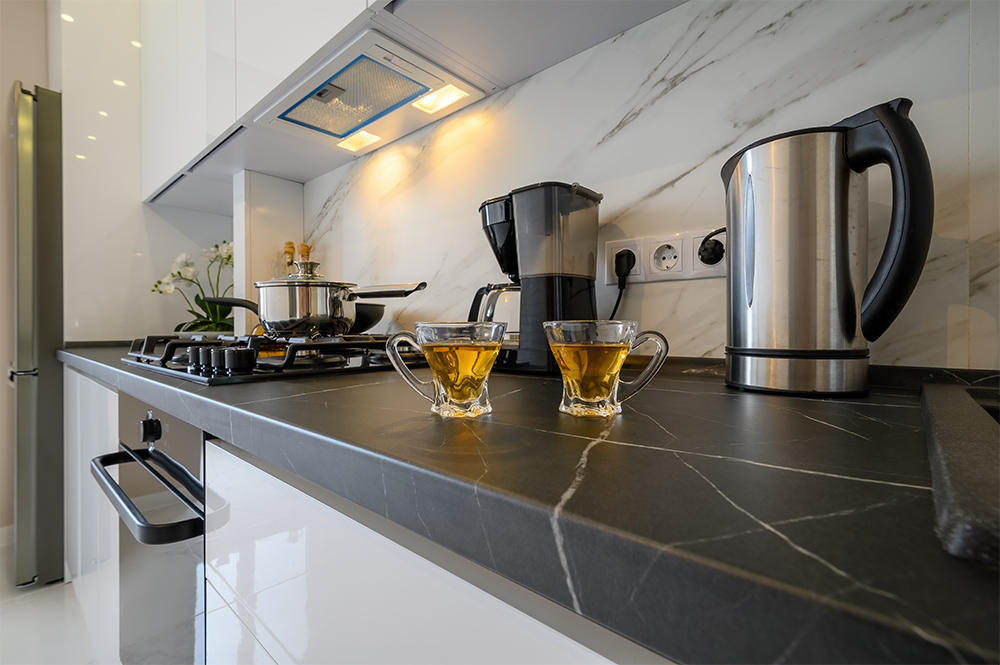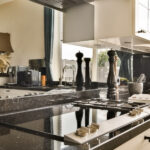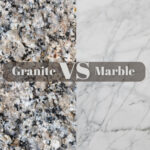Are you considering a stylish, durable, and low-maintenance option for your kitchen or bathroom? Porcelain countertops have rapidly emerged as a top contender, offering a sophisticated aesthetic and impressive performance. In 2025, these engineered surfaces are more popular than ever, renowned for their beauty and resilience. This comprehensive guide will delve into everything you need to know about porcelain countertops, from their composition and benefits to their cost, installation, and suitability for various applications. Whether you’re renovating your kitchen, upgrading your bathroom, or designing an outdoor space, understanding porcelain will help you make an informed decision for your home.
What Are Porcelain Countertops?
Porcelain countertops are crafted from a highly refined mixture of natural ingredients like quartz, kaolin clay, and feldspar. It’s not just regular ceramic; these materials go through an intense manufacturing process.
Imagine baking these raw ingredients at incredibly high temperatures (up to 2,500°F) and under immense pressure. This extreme heat and squishing essentially melt and fuse all the tiny particles, creating an exceptionally dense, uniform, and strong material.
This unique process gives porcelain its fantastic properties:
- Super Strong & Hard: Porcelain typically rates 7-8 on the Mohs scale, making it one of the hardest countertop materials available. This means it’s incredibly durable and highly resistant to scratches.
- Naturally Non-Porous: Because it’s so dense, porcelain doesn’t absorb water or liquids. This is a huge benefit as it makes the countertops naturally stain-resistant and means they never need sealing, unlike many natural stones. Spills simply sit on the surface, making cleanup a breeze.
Originally popular in Europe, porcelain is now a top choice in North America. Homeowners love it for its sleek appearance, high performance, and minimal maintenance. It offers both beauty and practicality, making it a smart and durable option for any kitchen or surface.
Porcelain Countertops Pros and Cons
Deciding on the right countertop material involves weighing its advantages and disadvantages. Porcelain countertops offer a compelling list of benefits, but it’s also important to understand their limitations.
Key Advantages
- Heat Resistance: One of porcelain’s most impressive features is its exceptional heat resistance. You can place hot pots and pans directly from the oven or stovetop onto the surface without fear of scorching or damage. This makes porcelain countertops ideal for busy kitchens.
- Stain Resistance: Thanks to its non-porous nature, porcelain naturally repels liquids, preventing spills from seeping in and causing stains. Coffee, wine, and acidic foods wipe away easily, making cleanup a breeze.
- Scratch Resistance: With a Mohs hardness rating of 7-8, porcelain is highly resistant to scratches, cuts, and abrasions from daily use. While no material is completely scratch-proof, porcelain stands up remarkably well to typical kitchen activities.
- Low Maintenance: Unlike granite or marble, porcelain countertops never need to be sealed. Their non-porous surface makes them incredibly easy to clean with just warm water and mild soap, offering a truly low-maintenance solution.
- Design Variety: Advancements in manufacturing allow for a vast array of designs, colors, and patterns. From realistic natural stone look-alikes, including intricate veining found in marble, to modern industrial finishes and solid colors, porcelain offers extensive aesthetic versatility to suit any decor.
Main Disadvantages
- Higher Cost: While offering long-term value, porcelain countertop cost can be higher upfront than some traditional materials, typically ranging from $60 to $120 per square foot installed.
- Limited Fabricators: The specialized nature of porcelain slab fabrication means that not all countertop companies have the expertise or equipment to work with it. This can limit your options for installers in some areas.
- Edge Chipping: While the surface is incredibly hard, the edges of porcelain can be susceptible to chipping if subjected to heavy impact from a dropped object. However, proper installation and mindful use can mitigate this risk.
- Surface Patterns: Most porcelain designs are printed on the surface of the slab. While technology has made these patterns incredibly realistic, the design doesn’t always go all the way through the thickness of the material, which can be a consideration for certain edge profiles or if a chip occurs.
Porcelain Countertop Cost Guide
Understanding the cost of porcelain countertops is crucial for budgeting your renovation project. While it represents a significant investment, its durability and low maintenance can offer long-term savings.
On average, porcelain countertops typically range from $60 to $120 per square foot, installed. This price range encompasses the material cost, fabrication, and professional installation.
Several factors influence the final cost: brand, thickness, edge treatments, and installation complexity. While the upfront investment for porcelain slab countertops might be higher than some laminate or entry-level granite options, consider the long-term budget implications. Porcelain’s exceptional durability and lack of sealing requirements translate to virtually no ongoing maintenance costs, offering significant value over the lifespan of your kitchen or bathroom.
Porcelain vs Other Countertop Materials
When choosing a countertop, comparing porcelain vs quartz and porcelain vs granite is a common and important step. Each material offers distinct characteristics.
Porcelain vs Quartz
- Heat Resistance: Porcelain handles direct heat better. Quartz, being resin-based, can be susceptible to thermal shock.
- Cost: Variable based on specific styles and brands, often in a similar range.
- Durability: Both excellent. Quartz is slightly more flexible, making it less prone to edge chipping under extreme impact, while porcelain’s surface hardness is superior.
Porcelain vs Granite
- Hardness: Porcelain (7-8 Mohs) is harder than granite (6-6.5 Mohs), offering better scratch resistance.
- Maintenance: Porcelain needs no sealing. Granite is porous and requires periodic sealing.
- Weight: Porcelain is significantly lighter, simplifying installation.
Maintenance and Care Tips
One of the most appealing aspects of porcelain countertops is their incredibly low maintenance. Their non-porous surface makes cleaning effortless and eliminates the need for special treatments.
For everyday spills, use warm water and a mild dish soap with a soft cloth. Avoid Windex (reduces shine), ammonia, bleach, or abrasive cleaners. For tough stains, white vinegar can be effective. No sealing is required, unlike granite or marble.
Popular Porcelain Countertop Styles and Designs
The versatility in design is a key reason for the growing popularity of porcelain countertops. Advanced printing technology allows manufacturers to replicate virtually any aesthetic.
Natural Stone Look-Alikes
One of the most sought-after styles for porcelain slab countertops is their incredibly realistic imitation of natural stone, without the associated maintenance.
- Statuario and Calacatta Marble Patterns: Offer classic elegance with crisp white backgrounds and dramatic grey veining.
- Black Marquina Options: Provides a sophisticated, modern look with striking white or gold veins.
- Granite-Inspired Textures: Mimics the speckled appearance of granite.
Modern and Industrial Styles
- Cement-Look Porcelain: Offers the raw, urban appeal of concrete without the porosity or weight.
- Solid Color Options: A wide spectrum of colors for minimalist designs.
- Contemporary Patterns: Geometric designs and unique finishes for avant-garde interiors.
Porcelain Countertop Thickness Guide
Understanding the available thickness options for porcelain countertops is important for both aesthetics and structural integrity.
Standard Porcelain Slab Thickness Options
- 6mm (¼ inch): Ultra-thin, lightweight applications like wall cladding, but less common for primary countertops.
- 12mm (½ inch): Most popular residential choice for porcelain kitchen countertops, balancing durability and cost.
- 20mm (¾ inch): Premium thickness, maximum durability, often for commercial or highly robust residential applications.
Choosing the Right Thickness
For standard porcelain kitchen countertops, 12mm is highly recommended. For large islands or heavy-use areas, 20mm can provide an even more solid feel. Thicker slabs generally cost more. Your fabricator will advise on specific support requirements and how thickness influences edge treatment options.
Kitchen Porcelain Countertops
Porcelain kitchen countertops are an outstanding choice due to their superior performance. Their heat and stain resistance are ideal for cooking and food prep, and their sleek profile integrates seamlessly with modern appliances.
Bathroom Porcelain Countertops
For bathrooms, porcelain offers both aesthetic appeal and practical benefits. Its moisture resistance prevents mold, its non-porous surface is hygienic, and its design versatility coordinates with fixtures.
Outdoor Kitchen Applications
Porcelain countertops are increasingly popular for outdoor kitchens thanks to their robust properties. They are highly resistant to UV rays (preventing fading), and can withstand extreme weather and temperature fluctuations.
Sustainability and Environmental Impact
Porcelain countertops present a favorable profile in terms of sustainability. They are primarily composed of abundant natural raw materials. Many modern manufacturers invest in greener technologies, including water recycling systems and efficient kilns. The extreme durability and longevity of porcelain slab countertops also mean they need to be replaced far less frequently, reducing waste over time.
Porcelain Countertop Installation Process
The installation of porcelain countertops is a specialized process that requires professional expertise to ensure a perfect fit and long-lasting performance.
Professional Installation Requirements
- Specialized Tools Needed: Fabricators require diamond blades, waterjet cutters, and polishing equipment.
- Fabricator Expertise Importance: Experience with large, thin, dense porcelain slabs is paramount for precise cuts and seamless results.
- Timeline Expectations: The process, from measurement to installation, typically takes a few weeks.
Installation Steps Overview
- Measurement and Templating: Precise templates are created after cabinet installation.
- Fabrication Process: Slabs are cut and shaped in the workshop, including sink and cooktop cutouts.
- Installation Day Procedures: Slabs are carefully transported and meticulously placed, leveled, and seamed by professional installers.
- Final Inspection Checklist: A final check ensures proper fit, levelness, and finish.
Is Porcelain Right for Your Countertops? (Complete Analysis)
Deciding if porcelain countertops are the perfect fit involves considering your lifestyle, design preferences, and budget.
When Porcelain Countertops Are Ideal
- High-Heat Cooking Environments: If you frequently cook and need a surface that handles hot items directly.
- Low-Maintenance Lifestyle: For a beautiful surface without sealing or special cleaning products.
- Modern Design Aesthetics: Perfect for sleek lines and large, seamless looks.
- Outdoor Kitchens: Due to UV resistance and weather durability.
- High-Traffic Areas: Offers excellent durability for commercial or busy residential spaces.
- Homes with Small Children: Hygienic and highly stain-resistant.
When to Consider Alternatives
- Budget-Conscious Projects: If your budget is extremely tight, less expensive options may be necessary.
- DIY Installation Attempts: Porcelain slab installation is not a DIY project.
- Limited Fabricator Access: Finding experienced installers can be challenging in some areas.
- Preference for Natural Stone Uniqueness: True natural stone offers geological variations porcelain cannot perfectly replicate.
Decision-Making Framework
- Lifestyle: Do you prioritize low maintenance and high performance?
- Budget vs. Value: Weigh the higher upfront porcelain countertop cost against long-term savings.
- Design Goals: Does porcelain’s versatility match your desired aesthetic?
The Complete Guide to Porcelain Countertop Disadvantages
A comprehensive understanding of porcelain includes its potential drawbacks.
Cost-Related Disadvantages
- Higher Upfront Investment: Can be pricier than some alternatives.
- Premium Fabrication and Installation Costs: Due to specialized requirements and skilled labor.
- Limited Availability: Can affect pricing in regions with fewer experienced fabricators.
Installation and Fabrication Challenges
- Limited Experienced Fabricators: Finding installers proficient in handling large, dense porcelain slabs is crucial.
- Specialized Tools: Requires specific equipment not all shops possess.
- Risk of Damage: Large, thin slabs can be delicate during transport and installation.
- Complex Edge Treatments: Achieving perfect mitered edges requires significant skill.
Design and Aesthetic Limitations
- Surface-Level Patterning: Designs are printed on the surface, which can be visible on exposed edges unless mitered.
- Less Natural Variation: While realistic, designs are manufactured, not organically unique like natural stone.
- Limited On-Site Repair: Significant chips or deep scratches are difficult to repair invisibly.
- Visible Seams: Large installations may require seams, though skilled fabricators minimize their visibility.
Performance Considerations
- Edge Chipping Potential: Susceptible to chipping under extreme, direct impact.
- Thermal Shock: Rare, but extreme temperature changes could theoretically cause issues.
- Hairline Cracks: Very rare, usually due to improper installation or cabinet settling.
Frequently Asked Questions
Performance Questions
- Do porcelain countertops chip easily? No, general chipping from normal use is rare due to porcelain’s hardness. Edge chipping can occur under heavy impact.
- Can you put hot pans on porcelain? Yes, you can put hot pans directly on porcelain countertops.
- Are porcelain countertops heat resistant? Yes, they have excellent heat tolerance.
Cost and Value Questions
- How much do porcelain countertops cost? $60-$120 per sq ft, installed.
- Are porcelain countertops worth it? Yes, for many, due to durability, low maintenance, and long-term value.
- Is porcelain more expensive than quartz? Variable by style and brand, often in a similar range.
Maintenance Questions
- How do you clean porcelain countertops? Warm water and mild dish soap with a soft cloth.
- Do porcelain countertops stain? Highly stain resistant due to low porosity.
- What thickness is best for porcelain countertops? 12mm (½ inch) is most popular for residential kitchens.
Comparison Questions
- Is porcelain better than granite? Often considered better due to higher hardness and no sealing needed, though granite offers unique natural patterns.
- What are porcelain countertop trends? The growing popularity of realistic marble looks and minimalist designs.
- What are the downsides of porcelain? Cost, need for specialized fabricators, and potential for edge chipping.
How to Choose the Right Porcelain Countertops
Selecting the perfect porcelain countertops involves ensuring quality and a successful installation.
Working with Contractors
- Questions to ask: Inquire about experience with porcelain, references, edge profiles, and warranty.
- Warranty considerations: Understand manufacturer and fabricator warranties.
- Quality certifications: Look for certified fabricators.
Conclusion: Are Porcelain Countertops Right for You?
Porcelain countertops offer a compelling blend of beauty, performance, and low maintenance, making them an excellent choice for many homeowners in 2025. Their exceptional heat and stain resistance, coupled with their incredible durability and vast design versatility, position them as a top-tier material for kitchens, bathrooms, and even outdoor spaces.
If you prioritize a surface that can withstand daily rigors without fuss, love the look of natural stone but prefer low maintenance, or desire a sleek, modern aesthetic, then porcelain kitchen countertops are likely an ideal fit. They are particularly well-suited for busy households, serious cooks, and those looking for a long-term, high-value investment in their home.
To decide if porcelain countertops are right for you, visit showrooms, get multiple quotes, and ask for references. Porcelain countertops represent a significant advancement in surface technology, offering superior performance and design flexibility, making them a wise and beautiful investment for your home.


